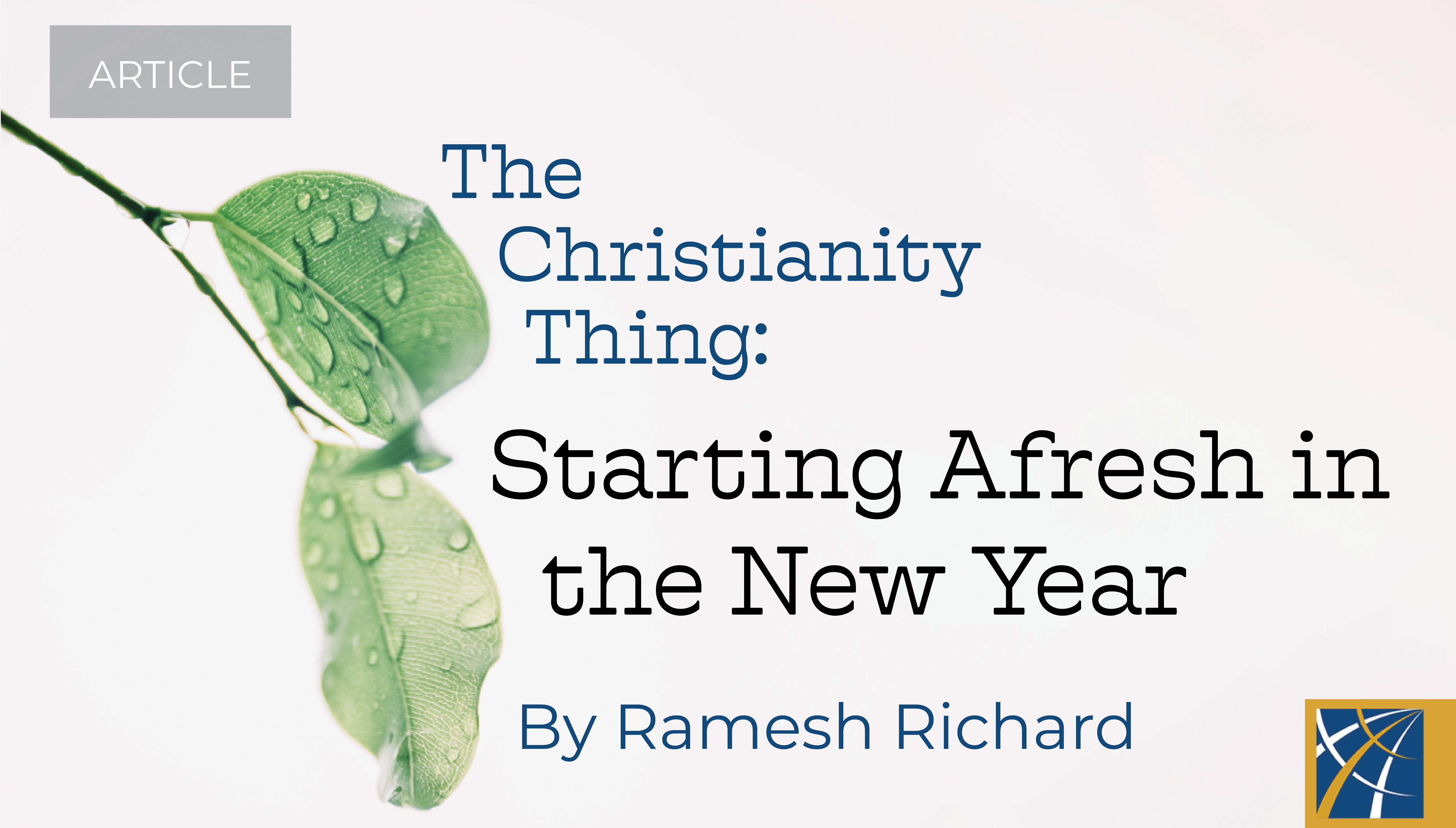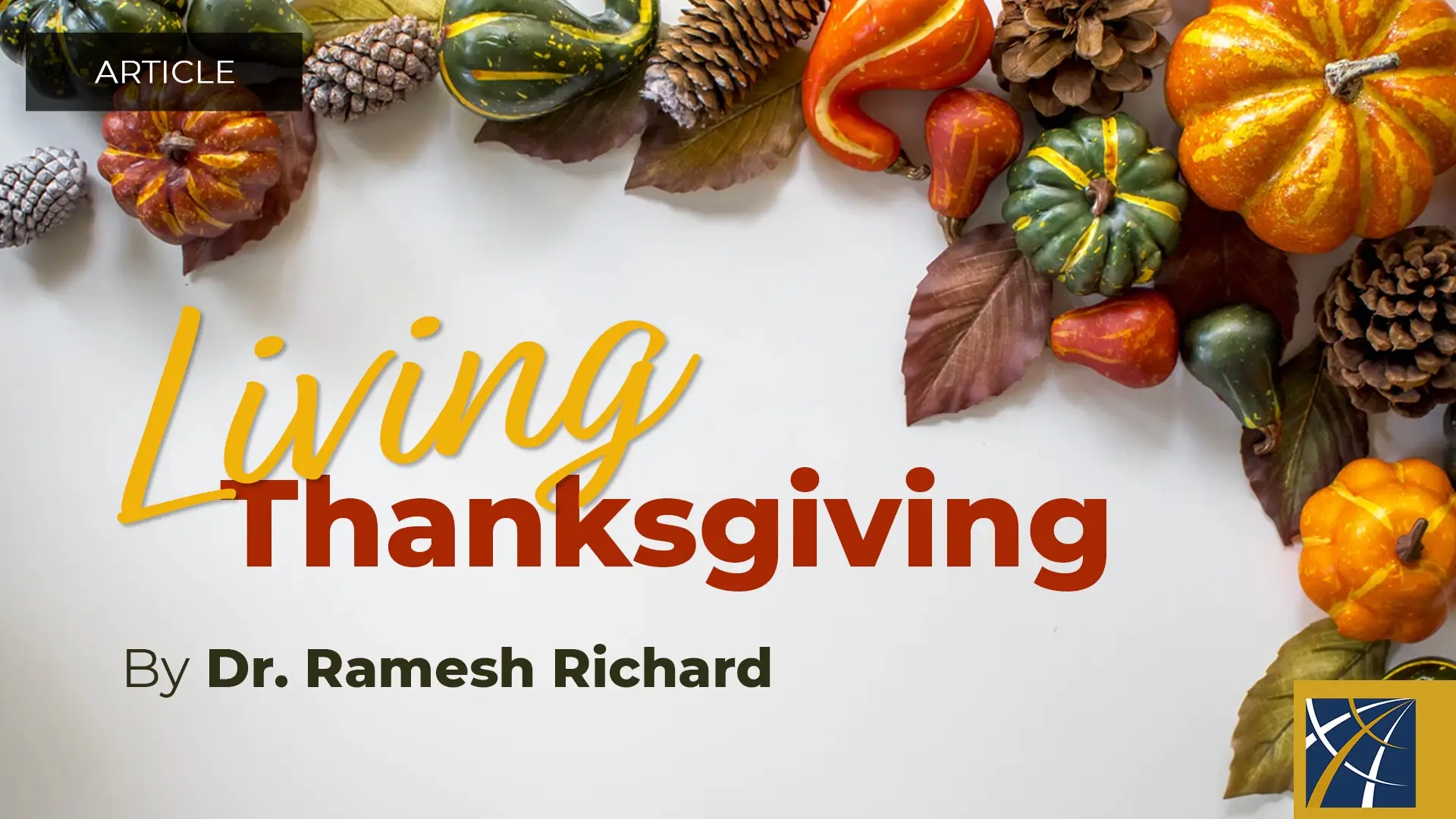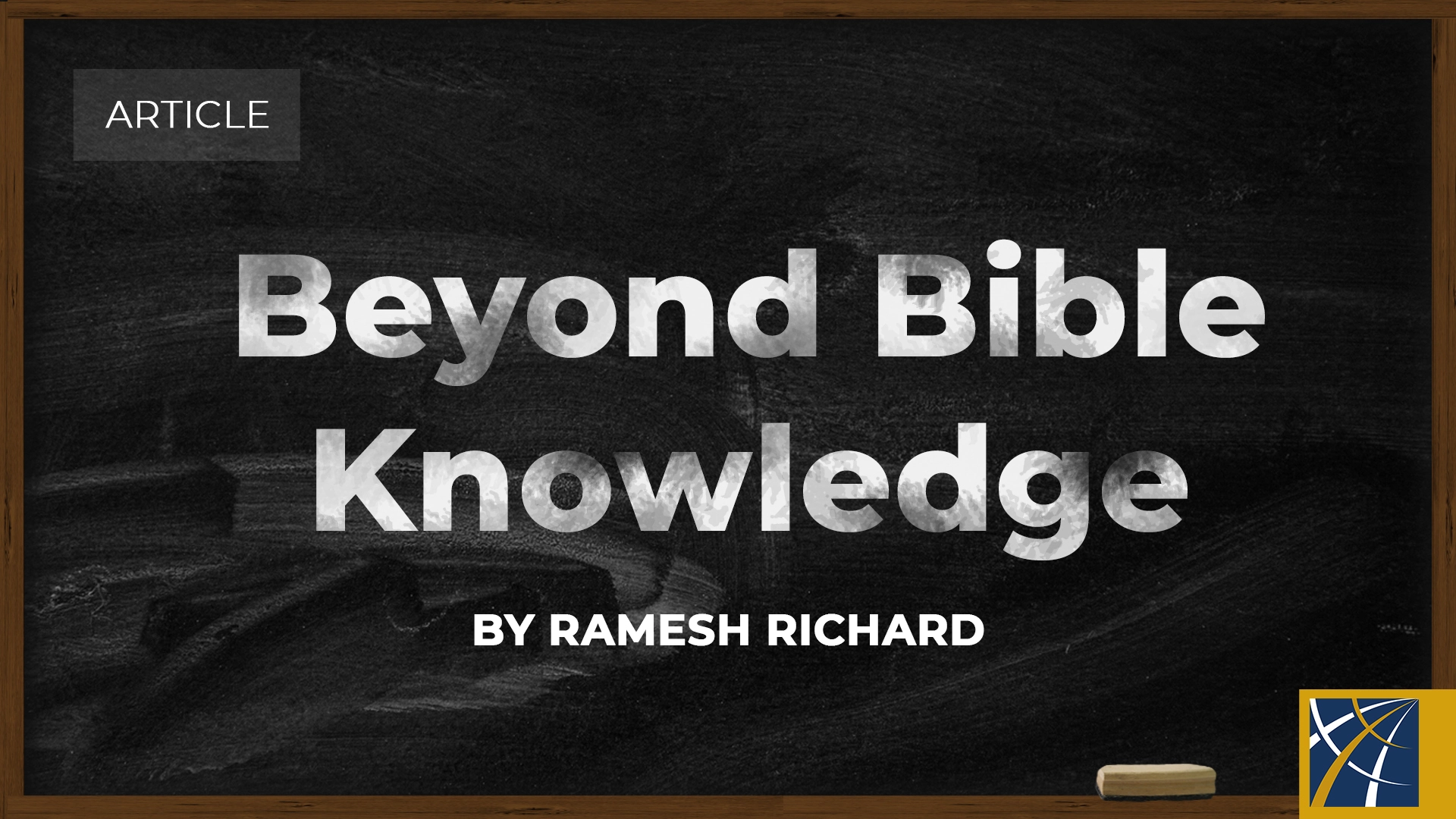by Ramesh Richard
At the beginning of each year, I eagerly welcome English theologian-philosopher G.K. Chesterton’s insight: “The object of a New Year is not that we should have a new year. It is that we should have a new soul.” He continues his metaphysical comment with a calling to a total renewal of life: “…and a new nose; new feet, a new backbone, new ears, and new eyes.” Each New Year’s Day provides us yet another opportunity to become new again, to do life over, and to be renewed. Chesterton finished his thought with the following: “Unless a man starts afresh about things, he will certainly do nothing effective.”
Starting fresh about things! Was it from British school teachers that students in India picked up their penchant for this favorite English word? Things is often used in Indian conversations—and because of a psychological propensity to read beyond what is stated and to draw meaning from the context of the conversation, we most often know specifically what the generic word things refers to. Sometimes we get into trouble with plainspoken people, who want us to interpret what is said as what is meant, but most often things refers to a wider range of unspoken but contextually articulated and influenced options.
So, to start fresh about this wider range of things, let me take things one step deeper. In philosophy, we attempt to define “things,” but then quickly begin to discuss the definition of the definition itself, to capture the essence, the core, the very nature of things. And you know what that kind of definition is called? A “Thing-Thing definition!”
Since GKC’s “things” is situated in a New Year declaration, I interpret him as calling for a fresh start each new year in everything important for an effective life—sort of a thing-thing definition of an effective life—its essence, its nature, its core.
As far as I know, everything important for the effective life is found in a Christian’s thing-thing relationship to the Lord Jesus Christ. You’ve heard of a “Mere Christianity” (C.S. Lewis), a “Basic Christianity” (John R.W. Stott), a “Simply Christian” or “A Simple Christianity” (N.T. Wright/John MacArthur). For the New Year (and the rest of our lives), I’d like to suggest a “Thing-Thing Christianity.”
A Thing-Thing Christianity could be about the theological foundations or philosophical sophistication of the Christian faith, or evangelistic-apologetics communication to pre-Christians. However, I am addressing a practical, Christian thing-thing definition for effective Christian growth and spiritual health—The Christianity Thing.
The Christianity Thing-Thing is the Lord Jesus Christ; and the Christianity Thing is an intentional, living relationship with Him.
Without Christ, there is no Christianity Thing-Thing or Christianity Thing. Having taught the Spiritual Life course at Dallas Seminary for about 30 years (if it can be taught), though not necessarily having lived it every moment, my concern for every Christian is to be a thing-thing Christian living the Christianity Thing.
I find five features capture a simple, mere, and basic Christianity Thing. To help you remember them, would you hold up one hand and spread out your fingers? Each digit adds varied strengths, yet the whole hand is best.
K________ Jesus
Know is our thumb word—the most important finger on your hand. The thumb makes most of the functions of the hand possible. It is also the only finger which can easily touch all the other digits on your hand. Hence, knowing Jesus becomes “epistemologically” most important to keep us embracing what is true, good and beautiful rather than what may be perceived as wrong, bad or ugly about Jesus. The best way to know Jesus is through His Word. Regular exposure to God’s Word in some way—even in the most minimal, cursory way—touches every other part of your life.
B________ Jesus
Physiologists note that your index finger, along with your thumb, accounts for 90 percent of hand function. I am presently in the Bible book of John, where knowing Jesus is simply not enough. We can know and yet reject what we know, a behavior found throughout the Gospels. Knowledge (cognition) is not the same as belief (reception). John’s Gospel is all about believing in Jesus as the critical issue for His disciples and all people. Belief not only initially receives eternal life—places us in union with Him—it also enlivens ongoing belief in Jesus, in abiding communion with Him. Believers in Jesus’ miraculous abilities can still fall short of trusting Him in the next situation. For example, “Lord, I believe, help my unbelief” is our powerful appeal because it takes faith in Jesus to pray it. Believe Jesus again, daily, for a renewed Christian life—a belief regularly expressed in heart-prayer.
L________ Jesus
In an echo of God’s first commandment and a clear post-resurrection claim to deity, Jesus directly asks Simon Peter, “Do you love me?” While knowing and believing Jesus are epistemologically necessary for Thing-Thing Christianity, loving Jesus is existentially necessary for the Christianity Thing. The middle digit, the tallest of the fingers, calls for Jesus’ first-love status in my life. As the tallest love, He prevents us from hard and soft idolatry. For some time, I have given notebooks to men in my life so they can start each workday with a written statement of love to their God and Savior. For me, it might be just three words or sometimes three pages! We know that whatever we love controls us. Our love for Jesus engages us in what delights Him as we obey His new command to love one another, our neighbors, and also our enemies.
F________ Jesus
Perhaps the most common way contemporary Christians refer to themselves (and other Christians) is as Christ-followers. I like the phrasing, but it’s only a part, a later overflow of the Christianity Thing. The ring finger stands for our following of Jesus. We are Christ-knowers, Christ-believers, Christ-lovers, and then Christ-followers. I know reasonably moral non-Christians who are “Christ-followers” because of His incredible teaching and sacrificial example, but who do not personally know, believe or love Him as their only God, Savior and Lord. I also know believers who stop at the first three levels, but don’t follow His principles and commands explained throughout the Bible. These Christians try to explain away His teachings as irrelevant today and diminish His leadership in how they live their lives.
In some countries, wedding rings are placed on the left hand and in other cultures on the right hand. To remove all doubt, I wear two wedding rings, one on each hand, and when asked I respond, “It’s better to have two rings and one wife than…the reverse.” December 27 was Bonnie’s and my 40th anniversary. Genuine congratulations go to her for sticking with me through some most difficult times. My ring finger does not have much independent movement, but the ring confirms and displays my commitment to the one I love. Similarly, our following Jesus daily affirms publicly our relationship with Jesus—the Christianity Thing.
P________ Jesus
While the little finger seems to be the least important, anatomy experts tell us that this last digit provides great strength and leverage for the rest of the hand. Gangsters sometimes cut off the little finger of unruly followers, because their grip would no longer be as strong. Here’s the point: many attempt to live the Christianity Thing without promoting Jesus in every facet of their lives—in their relationships and responsibilities, by word and by deed, and at home, school, work or play. Hence, they lose their grip on Thing-Thing Christianity. This happens to churches, too. If they concentrate on knowing Jesus without promoting Jesus, congregations lose their grip. They become puerile, infantile and selfish. Would you intentionally seek opportunities to promote Jesus’ name, salvation, grace, truth, values, and plan in every dimension and sector of your life?
I find that almost all other aspects of the spiritual life can be placed as subheadings under these five distinct (but not divisible) headings. Learn them, and live them, by heart. The Christianity Thing is to know, believe, love, follow and promote Jesus—by His grace and His Spirit’s power, and for the Father’s glory. Having already been made anew, may we start afresh in living the Christianity Thing flowing from a Thing-Thing Christianity. Should I wish you a Happy ReNew Year?






